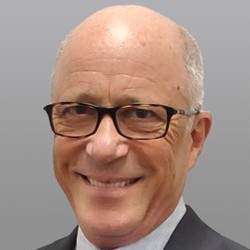Alumni Spotlight - Dr. Joseph Mignogna
Residency Class of 1981
What made you want to enter the medicine field?
My high school football coach came up to me one day in his chemistry class and asked, “What are you going to do after high school?” I started stumbling over my words and just blurted out, “Med school.” He responded, “Alright, don’t change your mind.”
At first, I was confused about why I said that because I had wanted to be a meteorologist or a photographer. But since I had said "med school," I figured I might as well stick with it. The more I looked into it, the more I realized it was kind of cool. I ended up staying in Philadelphia at Temple University for both my undergraduate studies and medical school—and I never looked back.
What attracted you to the Brown Family Medicine Residency?
When I was interviewing for residencies, I looked all over the place, and it just so happened that I knew one of the early residents at Brown. I contacted them and came up for an interview—it was nice to already know someone in the program.
I fell in love with the directors at the time, particularly Dr. Cunningham. For family medicine, it felt like a very family-oriented and supportive environment. I looked at other places, but they seemed sterile and rigid. Brown was more like the family medicine concept that I always thought of.
“ Brown was more like the family medicine concept that I always thought of. ”
What valuable lessons did you learn from your time at Brown in residency?
"Shut up and listen." That’s what one of my mentors—a doctor from New Zealand (his name escapes me)—told me. I can still hear it today, even a million years later: "Just shut up, introduce yourself, and the patient will tell you what you need to know. You don’t even have to ask."
The patient will tell you, and if something doesn’t make sense, just stay quiet and wait—they will eventually reveal what’s really going on. I think that was the biggest lesson I learned, and it served me well in trauma centers, the Department of Transportation, IMEs, and beyond. Just listen.
What have done in your career and what are you doing now?
What are you most proud of in your career?
That I was able to make a difference in some of the organizations I worked at. I’ve always been very interested in population health. So, when I was running my clinics at Glaxo or the clinic at Nissan, and someone came in with back pain or persistent headaches that prevented them from doing their job, I took a step back to understand the bigger picture.
That’s something I learned at Brown—sit back, look at the whole person, and you’ll see things you wouldn’t believe. I’ve always been proud of that ability.
When you do that, you generate a lot of information and data. You can then analyze population statistics and start to recognize patterns. For example, when you see certain symptoms, you can almost predict what will happen next. Instead of focusing on high cholesterol in a particular group, maybe we should be addressing related issues that are more pressing. I’ve always been able to direct my efforts toward the populations most at risk.
Do you keep in touch with your former residents?
Absolutely! Over the last three to four years, I’ve become the designated “let’s get everyone together” guy. Around this time each year, out of the 12 residents in our group, 10 are still living, and I’ve been able to locate eight of them. We stay connected through email and the occasional text. It’s really neat to see where everyone is now and the different paths they’ve taken.
What advice do you have for current residents?
Work-life balance, 110%. There were 1-2 of us in the program who seemed to always get out when we weren’t on call. We’d leave by 5:00 or 5:15, while everyone else stayed late into the evening. I just had the mindset of getting my work done quickly—there’s a whole life behind you, with kids waiting for you, girlfriends, husbands, etc. … get home.
That really made a difference. I felt more comfortable, wasn’t stressed out, and was able to feel refreshed in the morning. The relationships I had also survived because of that balance.
Who were your mentors?
When I got to Brown, I met the other residents who were two years ahead of me, and they became good friends. We’d go out together to pool halls and even had a bowling team. I talked with friends in other programs, and they were like, “WHAT?!? You do all that?” I’m still in touch with a bunch of the residents today, which is really neat!